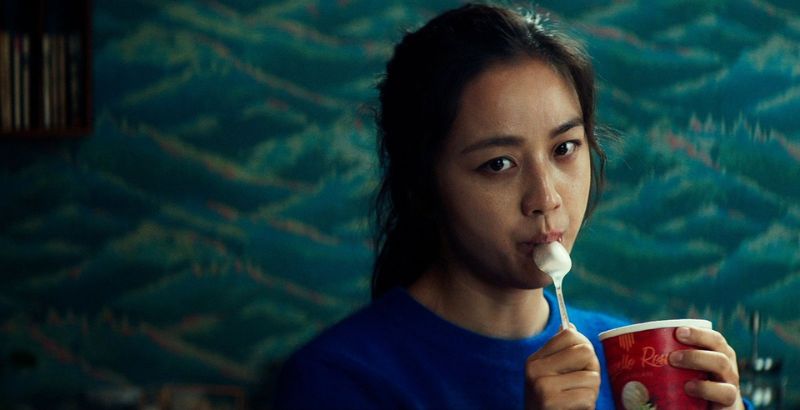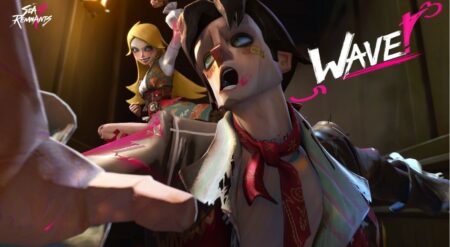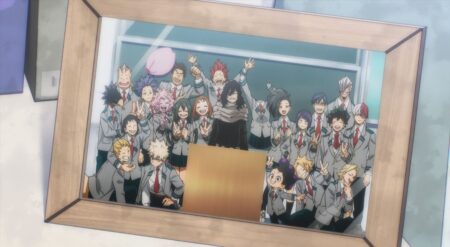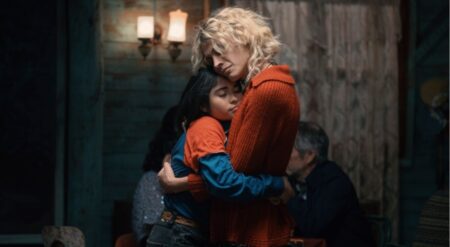While some know Park Chan-wook for his exploration of violence and bleak endings, the first time I saw a film by this iconic director was a candy-colored romance called I’m a Cyborg, But That’s OK, a weird rom-com that takes place in a mental institution between two individuals who deeply love each other but don’t quite know how to communicate and a vibrant color palette made the film perfect for me. Then, I explored more.
I watched Old Boy, which, despite its ending still has romance at its core, and of course the rest of the Vengeance trilogy. And then, finally, I found my favorite vampire film. Baked in romance and blood, director Park’s Thirst solidified for me that this is a director who loves love, or instead exploring the ways in which it can twist and turn in all of us. Decision to Leave is a culmination of this. A noir detective thriller and a star-crossed romance in one, I was captivated.
I got the chance to talk to director Park Chan-wook about his mastery of romance, the pivot to implicit intimacy and emotion instead of explicit, and how he blended together detective noir and romance. To begin, I asked Park about the choice to make the romance quiet and dependent on paying attention instead of plainly visible through sex or grand confessions, as we’ve seen in his other film.
Park Chan-wook explained, “Most of my films have elements of romance but for this film, romance was expressed in a very quiet manner. what’s interesting is that my previous films showed romance in extreme and explicit fashions. Still, for this film, where I tried to show romance in a more quiet and implicit fashion, people understood this film more are a romance film.” And it’s true. Often when I speak about the romance that runs through Park’s films, even including the Vengeance trilogy, the explicit nature of desire and intimacy gets overshadowed by the violence, taboo, or bleak nature of it all. In his most romantic of moments in his long filmography of breaks, romance isn’t the first thing that comes to mind.
Park adds, “I think the reason behind it is that the relationship between our male and female protagonists raises more sympathy out of audiences. I don’t think it’s quite the word sympathetic. You might even say it’s more deplorable, or you’re more anxious to see them come together because you know it will be difficult, especially since our protagonist is a married detective trying to begin a romantic relationship with his suspect. That’s why the emotions toward each other are so repressed, and it takes a lot of concentration to catch these traces of romance. So even with the subtlest facial expression or change of a look, it conveys a change of emotion.” It’s in this will they won’t they and definitely shouldn’t atmosphere of romance that Decision to Leave drives its tension, and its actors Park Hae-il and Tang Wei perform through intimate nuance as Hae-Joon and Seo-rae.

But it isn’t just in the dialogue or the acting; the romance and its climax are pushed by how Park Chan-wook chose to shoot the film. He explains, “I supposed that there is a film mostly made up of wide shots; we only see wide shots of the characters in the film. But at the end, there is this one shot that moves closer up, a medium that captures up from the chest, and that comes as a bigger shock to the audience than a film that is mostly made up of close-up shots, and then we get an even closer shot of characters.” The lens captures the characters as distant and small, only to pull in tight in the film’s third act and increase the intimacy, romance, and vulnerability on a cold mountain. It’s effective, from start to finish.
The beauty and staying power of Decision to Leave isn’t just in its romance, but in how director Park Chan-Wook manages to seamlessly blend a crime thriller and a yearning romance. Obsession can be the undercurrent for both of these genres, yes, but it’s in Park’s execution that we see how both genres are respected, mastered, and brought together. Park says, “The balance between those two elements was the goal I set out to make the film with. A typical romance film would have characters having a nice date at a cafe, and scenes in this vein would have expressed the romantic and sweet relationship between our characters. But this love story wasn’t under the same circumstances, so I had to make the process of an investigation and the process of romance into one. Where the characters first fall in love is central to a romance film. And for my characters, that’s at the morgue, which I think is a very interesting and funny situation.”
He continues, “Afterwards, our male lead gets to know the female character through stakeouts or investigating her background, not the typical way they would talk and open up about their lives. It’s a one-way investigation of the woman, you could say. You might even day that his actions come off as perverted as well. But it’s not perverted because the detective can be justified by doing this as a mission for his job. So in the scene where Hae-joon is observing Seo-rae take care of the woman, he wants to see her facial expressions more clearly. He wants to breathe the same air that she does and he imagines himself in the same space that she’s in. At this point, it’s very unclear what’s happening. We’re sitting at the boundary of him doing his duty as a detective and him stalking this woman as a stalker.”
While Hae-joon is a character you can root for, it’s the balance on the line between stalker and detective that makes the complex relationship between the two even deeper. And instead of throwing him into the role of a man forcibly crashing boundaries against the female lead’s will, Park and Jeong Seo-kyeong have written a character whose agency is only present at the will of the woman he is falling in love with. While it may seem like Hae-Joon is in control, it’s always Seo-rae who has the upper hand, reciprocating the feelings over and over.

On Seo-rae and building out the romance through a crime drama, Park explained, “[Seo-rae] knows that [Hae-joon] is watching her at night, and instead of being creeped out, she says that she is being protected by a trustworthy man. It’s almost showcasing that they’re really meant for each other. And the most important part of this romance is the interrogation scene because it’s no longer a one-way relationship.
“Now they can sit face-to-face and have a conversation. But this scene is not like a dating scene in other romance films because they know that they are being observed by someone else, and they are very aware of this fact. So the conversation that they share has to hide the emotions between them and is filled with innuendos. The way in which they convey their emotions is through the subtle changes in their facial expressions because they need to be subtle enough for others not to know what’s going on. This is how I tried to blend the elements of an investigation film and a romance film.
If there is one thing that Decision to Leave proves, it’s that Park Chan-wook is an unequivocal master of romance. The film itself adds more depth to his filmography. Horror, Revenge, Drama, Thriller, and Crime Drama all come back to romance in a beautiful way, making this film a jewel in his creative list. Beautiful and bleak, Decision to Leave is one of the best films of the year, and that’s thanks to how deeply director Park Chan-wook understands emotional storytelling and intimacy.
Decision to Leave is streaming now on MUBI.







